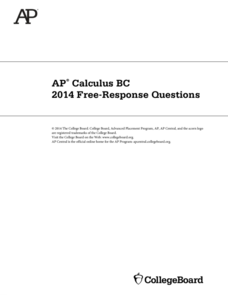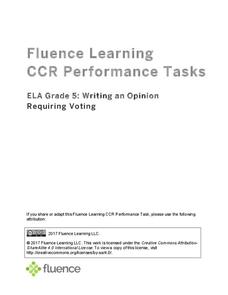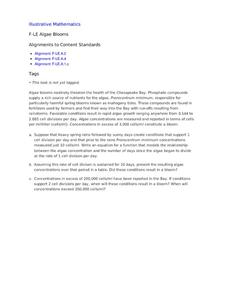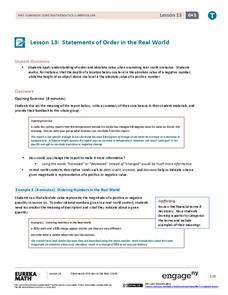Curated OER
What Did the Teacher Say?
In this questions and answers worksheet, students complete a ten question on-line interactive activity about reported speech. Students read a question or statement made by another person. Students tell what was said by the person.
College Board
2014 AP® Calculus BC Free-Response Questions
How much of the material is really important? Pupils use the free-response questions from the 2014 AP Calculus BC exam to see how the questions appear. With the supporting material, teachers understand the topics that appear on the test...
College Board
2011 AP® Calculus AB Free-Response Questions
So this is the real test? The resource provides the free-response questions from the 2011 AP Calculus AB exam. The six questions are split into two sections, calculator and non-calculator items. Several resources give teachers...
PreKinders
Pre-K Assessment Forms
This is a Pre-K teacher's must-have resource for pre-assessing learners at the beginning of the school year! Covering everything from alphabet recognition and sorting objects to social-emotional development and work habits, this...
College Board
2018 AP® Physics 2: Algebra-Based Free-Response Questions
While the AP Physics 2 test maintains the reputation for one of the most difficult AP exams, scholars feel better prepared after practicing free-response questions on currents, conservation of energy, and displacement. The College Board...
Fluence Learning
Writing an Opinion Requiring Voting
Challenge writers to compose an essay detailing their stance on, and the history of, voting. Three assignments, each broken down into three parts, requires fifth graders to take notes, read and complete charts, write paragraphs, compare...
EngageNY
Solving Problems by Finding Equivalent Ratios
Combine total quantities and equivalent ratios in problem solving. The fifth instructional activity in a series of 29 presents problems that can be solved using equivalent ratios. Pupils use part-to-part ratios and either sums or...
EngageNY
Justifying the Geometric Effect of Complex Multiplication
The 14th lesson plan in the unit has the class prove the nine general cases of the geometric representation of complex number multiplication. Class members determine the modulus of the product and hypothesize the relationship for...
EngageNY
Putting the Law of Cosines and the Law of Sines to Use
Use the Law of Cosines and the Law of Sines to solve problems using the sums of vectors. Pupils work on several different types of real-world problems that can be modeled using triangles with three known measurements. In the process,...
Curated OER
Calories in a sports drink
How much can a company round numbers without being misleading? Learners investigate the accuracy of claims made by a sports drink company. Teachers could easily modify the activity by bringing in their own beverage bottles, or by taking...
Virginia Department of Education
Angles, Arcs, and Segments in Circles
Investigate relationships between angles, arcs, and segments in circles. Pupils use geometry software to discover the relationships between angles, arcs, and segments associated with circles. Class members use similar triangles to...
Ed Change
Equity and Diversity Awareness Quiz
Here is a multiple choice assessment in which students respond to 15 questions relating to social justice, equity, and diversity issues in the United States.
Curated OER
Algae Blooms
Your microbiologists explore a changing algae population and build an exponential function modeling algae concentration from the description given of the relationship between concentrations in cells/ml and days of rapid growth.
Inside Mathematics
Swimming Pool
Swimming is more fun with quantities. The short assessment task encompasses finding the volume of a trapezoidal prism using an understanding of quantities. Individuals make a connection to the rate of which the pool is filled with a...
Curated OER
Quinoa Pasta 3
A mixture of quinoa and corn is for dinner in this collaborative task that sets up nicely as a system of linear equations. Your supper guests discuss numerical precision and percentages as they formulate a plan of how to solve the problem.
Curated OER
A Saturating Exponential
Your learners analyze the familiar model of a cold beverage warming when it is taken out of the refrigerator. The general form of the equation and its graph are presented. Learners learn about the specific pieces of the function by...
Achieve
Corn and Oats
How much land does a parcel hold? How much fertilizer does it take for a field of corn? Pupils answer these questions and more as they apply ratio reasoning and unit analysis.
Curated OER
Various Questions I
In this various questions worksheet, students fill in the appropriate phrases to the sentences that are missing them. Students complete 19 sentences.
Curated OER
Compound Modifiers
In this sentences activity, students complete an on-line interactive page in which 8 halves of sentences are matched to the correct endings. All sentences have a compound modifier.
College Board
2018 AP® Human Geography Free-Response Questions
What role do women play in agrarian economies? How has gentrification affected neighborhoods in positive and negative ways? To what extent has language evolved over time? Learners consider these questions using authentic test questions...
EngageNY
Statements of Order in the Real World
Positive and negative numbers are all around us. Groups read short story contexts and identify a rational number that represents the values in the context. They order the rational numbers and interpret statements of inequality.
EngageNY
Modeling a Context from a Verbal Description (part 2)
I got a different answer, are they both correct? While working through modeling problems interpreting graphs, the question of precision is brought into the discussion. Problems are presented in which a precise answer is needed and...
EngageNY
True and False Number Sentences II
Substitution is still the method of choice to verify number sentences. The detailed lesson has young mathematicians determining conditions for when number sentences are true or false through substitution. They learn to express these...
EngageNY
Displaying a Data Distribution
Pupils analyze a display of data and review dot plots to make general observations about the highest, lowest, common, and the center of the data. To finish, learners match dot plots to scenarios.























